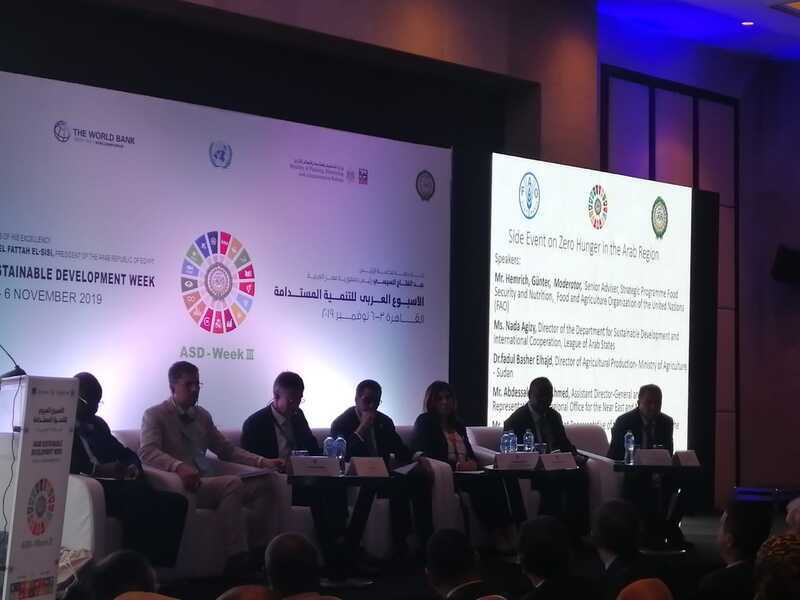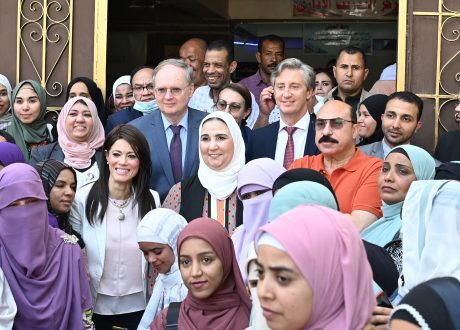By
Mohamed El Ghobashy
-
-
|
Edited by
Marwa Nassar
The Arab Sustainable Development Week highlighted the initiatives launched in the Arab world to end hunger in line with the Sustainable Development Goal 2.
Guenter Hemrich of the Food and Agriculture Organization (FAO)’s Economic and Social Development Department – who moderated the session – said the get-together is meant to spell out the strategies adopted by several Arab states to eradicate hunger in addition to presenting stories of success in this regard.
The gathering aims to come up with what can be considered as a roadmap to accelerate Sustainable Development Goals achievement in the Arab world.
Fadl Bashir of the Sudanese Agriculture Ministry explained the challenges hampering the Arab efforts to end hunger in view of regional conflicts, rising numbers of refugees, bloating population and climate change.
He highlighted the impact of all these challenges on food production and food security at the regional and international levels.
He said all the aforementioned factors have contributed to rising rates of hunger and malnutrition in the Arab world. About 80 percent of poor people are living in rural area and most of them depend on agriculture, he said, noting that a large number those people die of malaria, HIV/Aids and tuberculosis due to hunger and deficiency in the immune system.
He added that 45 percent of infant mortality was attributed to malnutrition, noting that stunting is still a major challenge facing children under the age of five.
The Arab League with its sub-committees concerned with eliminating hunger have contributed to pinpointing the most important targets and activities that should be placed within the framework of action plans set to accomplish the Sustainable Development Goals 2030, he noted.
Meanwhile, Minister Plenipotentiary Nada El Agizy, the AL’s Sustainable Development and International Cooperation Director, said there are a lot of challenges facing the Arab world to achieve the Sustainable Development Goals, especially the second goal on ending hunger and realizing food security.
She said the majority of people suffering from hunger are living in developing states, warning of the deterioration of nutrition of babies and children under five in these countries, particularly in states which suffered for long from humanitarian crises like Somalia and Palestine.
She added that statistics concerning obesity and non-communicable diseases in regional states are alarming. Deaths caused by obesity and hunger represent 52 percent of total deaths and this percentage is expected to hit 60 percent by 2020.
For his part, FAO Assistant Director-General for North Africa and the Near East Abdel-Salam Ould Ahmed said such unsustainable production and consumption mechanisms of the past can never be adopted in the future because there was excessive use of resources, especially water.
He said the planet is not capable any more to absorb pollution and greenhouse gas (GHG) emissions coming from industrial process. This pollution and GHG emissions combined with climate change had a ripple effect on the environmental system, agriculture and food security. He called for taking into consideration the environmental perspective in the industrial process.
He said about 30 percent of food is lost during the production process, adding that about 2 billion people are expected to suffer from water scarcity, a matter which will harm agricultural lands.
He expressed concerns that about 221 million people are suffering from malnutrition.
He called for swift and effective action to address food insecurity, noting that this was the basis of the FAO-AL partnership which is meant to sustainably eliminate hunger in the Arab world. He highlighted the importance of drawing on successful experiments in the region.
Meanwhile, Mario Arvelo – representative for Latin America and the Caribbean region initiative for eliminating hunger – said eradicating hunger is a political issue, calling for rallying efforts to realize food security and settle conflicts.
He urged heads of state and government officials to adopt a comprehensive and integrated mechanism in order to have a regional strategic plan to be implemented at local levels.
He called for linking these strategic plans with inter-trade and FAO as well as getting cash transfers to be conditioned with being spent on local production, agriculture, nutrition and education.
Meanwhile, Walid Abd Rabbu – an international expert in preparing strategic frameworks and action plans – said many women, men and children sleep hungry, while a huge amount of food is wasted.
He said the challenges besetting the Arab world are diverse and mostly linked to water shortage, citing what AL Secretary General Ahmed Abult Gheit said as about 80 percent of Arab region water comes from outside the region.
He added that the Arab region unfortunately suffers from many conflicts and crushing crises.
He urged the Arab region step up efforts to join the march of sustainable development as the region is delayed almost four years in SDGs attainment.




اترك تعليقا